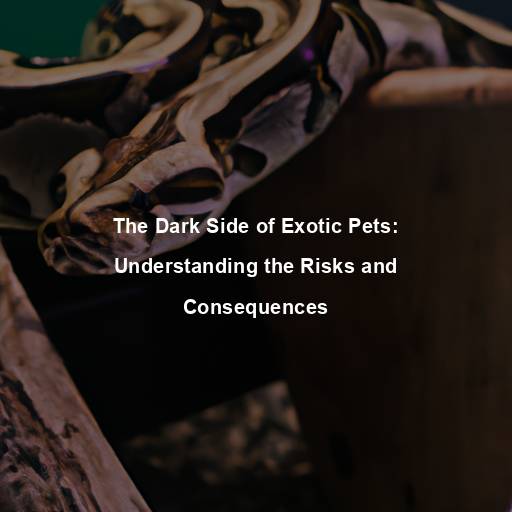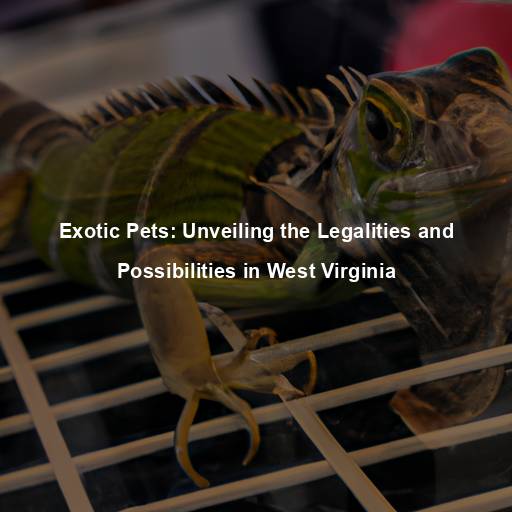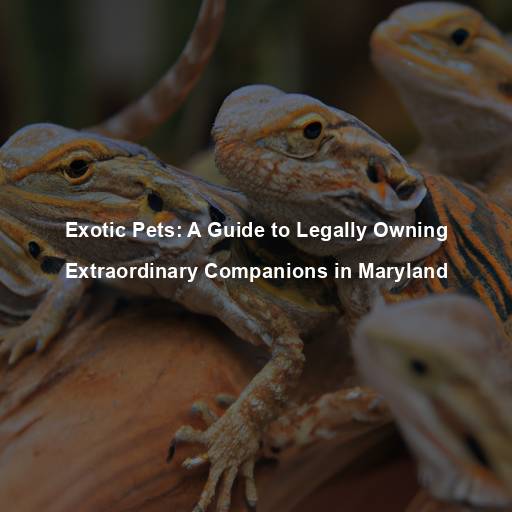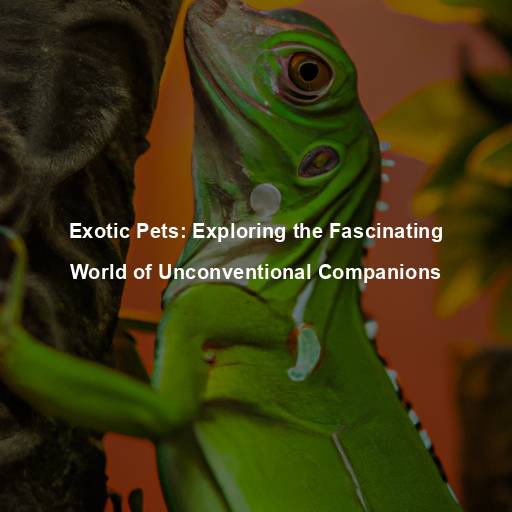Exotic Pets: A Guide to Understanding Legalities in Oregon
Last Updated on August 7, 2023 by Evan
Contents
- 1
- 2 The Legal Landscape of Exotic Pet Ownership
- 3 Responsible Exotic Pet Ownership
- 3.1 Extensive Research and Education
- 3.2 Consulting with Experts
- 3.3 Creating an Enriching Environment
- 3.4 Understanding the Commitment
- 3.5 Misconception 1: Exotic Pets Are Low Maintenance
- 3.6 Misconception 2: Exotic Pets Can Be Released into the Wild
- 3.7 Misconception 3: Exotic Pets Are Suitable for All Homes
- 4 The Importance of Education and Awareness
- 5 The Role of Legislative Measures
- 6 Building a Supportive Community
- 7 FAQs – What Kind of Exotic Pets are Legal in Oregon?
- 7.1 Q1: Can I legally own exotic pets in Oregon?
- 7.2 Q2: Which exotic pets are legal to own in Oregon?
- 7.3 Q3: Are there any restrictions on owning large exotic animals in Oregon?
- 7.4 Q4: Do I need permits or licenses to own exotic pets in Oregon?
- 7.5 Q5: Are there any restrictions on importing or transporting exotic pets into Oregon?
- 7.6 Q6: Are there any resources or organizations that can provide assistance with owning exotic pets in Oregon?
Discover the awe-inspiring world of exotic pets, where vibrant reptiles, colorful birds, and captivating mammals ensnare the hearts of animal enthusiasts everywhere. But, before you take the plunge into this exciting realm, it is imperative to untangle the perplexities of legality that surround these extraordinary creatures. Our comprehensive guide intricately unwraps the laws and regulations governing exotic pet ownership, shedding light on the fascinating landscape in the state of Oregon. Embark on this journey with us and unlock the secrets of maintaining an enchanting and legal relationship with your exotic companion.
Understanding Exotic Pets
If you’re in the mood for something a little out of the ordinary, why not consider getting an exotic pet? These fascinating creatures, ranging from reptiles and amphibians to birds and even insects, can add a touch of excitement to your life. However, it’s important to remember that they come with their own set of challenges. From specialized care needs to potential risks, owning an exotic pet requires careful consideration and responsible management.
The Legal Landscape of Exotic Pet Ownership
Researching State Laws
Taking care of an exotic pet can be truly exhilarating, but before plunging into this thrilling endeavor, it’s vital to unravel the complex web of laws and regulations that may snare you. Each state, including Oregon, wields its own unique statutory power over exotic animal ownership. By scrupulously immersing yourself in the intricacies of these laws, you can navigate the perplexing landscape of exotic pet ownership with confidence, ensuring the optimal well-being of your extraordinary companion.
Oregon’s Exotic Animal Laws
In the mesmerizing land of Oregon, where nature’s wonders flourish and captivate, lies a labyrinth of regulations overseen by the enigmatic Oregon Department of Agriculture (ODA). Tasked with safeguarding exotic creatures and ensuring the populace’s safety, the ODA diligently upholds the state’s exotic animal laws. These intricately woven laws unfurl their protective tapestry to shield against the encroachment of invasive species, preserve the delicate balance of indigenous wildlife, and navigate the complex realm of risks entwined with owning exotic pets.
Prohibited Exotic Pets in Oregon
While the allure of exotic pets is undeniable, it is important to note that certain animals are prohibited from being kept as pets in Oregon. The ODA has identified specific species that are considered dangerous or have the potential to become invasive. Some examples of prohibited exotic pets in Oregon include primates, big cats, bears, venomous reptiles, and large constrictor snakes.
Exemptions and Permits
While the ownership of certain exotic pets may be prohibited, exemptions and permits can be obtained under specific circumstances. The ODA provides a permitting process for individuals who wish to keep prohibited exotic animals for educational, scientific, or exhibition purposes. However, these permits are subject to strict regulations and oversight to ensure the welfare of the animals and public safety.
Legal Exotic Pets in Oregon
Although some exotic pets are prohibited, there are still numerous species that can be legally owned in Oregon. These include certain reptiles, amphibians, birds, small mammals, and non-venomous snakes. It is important to note that even with legal exotic pets, responsible ownership and adherence to local regulations are crucial to maintain the well-being of the animals and ensure public safety.
Responsible Exotic Pet Ownership
Extensive Research and Education
Before bringing an exotic pet into your home, it is essential to conduct extensive research and educate yourself about the specific species you are interested in. Understanding their natural habitat, dietary needs, social requirements, and potential health issues is vital to provide a suitable environment and ensure the well-being of your exotic companion.
Consulting with Experts
When it comes to fulfilling the curiosity of nurturing an exotic pet, the path to enlightenment lies in seeking the sage advice of seasoned professionals in the field. Those wise veterinarians who possess extensive knowledge in treating these extraordinary creatures or the esteemed breeders and organizations dedicated solely to your specific species of interest can serve as your guiding light in this perplexing journey. By harnessing their expertise, you will be empowered to make enlightened choices and provide your exotic companion with the pinnacle of care. Embrace their wisdom and unlock the secrets to nurturing your exotic pet with awe-inspiring finesse.
Creating an Enriching Environment
When it comes to exotic pets, their needs can be as perplexing as they are fascinating. These creatures often demand environments that are a far cry from the ordinary, with temperature-controlled enclosures, specialized lighting setups, and even dietary supplements that defy convention. But fear not, for creating an enchanting atmosphere that mirrors their natural habitat is the key to ensuring these extraordinary companions flourish both physically and mentally. So, delve into the realm of the extraordinary and embark on a journey of discovery as you unveil the secrets to nurturing your one-of-a-kind exotic pet.
Understanding the Commitment
Taking on the responsibility of an exotic pet is an awe-inspiring journey that demands unwavering dedication and thoughtful deliberation. These extraordinary creatures, blessed with remarkable longevity, will traverse the tapestry of time by our side. Yet, let us not forget that their needs will metamorphose as they mature, demanding an even greater investment of resources—both financial and emotional. Thus, it becomes of paramount importance to embark upon this adventure with eyes wide open, weighing the profound devotion and fleeting moments of doubt that come hand in hand with the ownership of such a rare marvel.
Misconception 1: Exotic Pets Are Low Maintenance
When it comes to exotic pets, there’s a whisper of misleading information that paints them as low-maintenance alternatives to our furry friends. Brace yourself, because that’s far from reality! These extraordinary creatures come bundled with their own set of demands – from meticulous dietary peculiarities to intricate environmental prerequisites – not to mention the specialized veterinary care they might necessitate. To truly embrace the company of an exotic companion, it’s vital to grasp and cater to their singular needs, ensuring their welfare and happiness.
Misconception 2: Exotic Pets Can Be Released into the Wild
It’s time to debunk another widespread misconception surrounding exotic pets: the belief that if an owner can no longer care for them, they can simply release them into the wild. Let’s unpack this perplexing notion and shed some light on its consequences. Firstly, it’s essential to understand that such an act is not only against the law but also overwhelmingly harmful to both the animal and the delicate balance of the ecosystem. Exotic pets are ill-equipped to fend for themselves in their non-native habitats, and their introduction can lead to the disruption of native wildlife populations or the transmission of diseases.
Misconception 3: Exotic Pets Are Suitable for All Homes
It is important to recognize that not all homes are suitable for exotic pets. Some species require ample space, specific environmental conditions, or specialized equipment to thrive. Before bringing an exotic pet into your home, evaluate whether you can provide a suitable habitat that meets their unique needs. It is crucial to prioritize the welfare of the animal and ensure that you can meet their requirements for the duration of their life.
The Importance of Education and Awareness
Educating Potential Owners
Education plays a pivotal role in promoting responsible exotic pet ownership. By providing potential owners with accurate and comprehensive information about the care, requirements, and legalities surrounding exotic pets, we can empower them to make informed decisions. This education can be facilitated through various channels, including online resources, community workshops, and collaboration with local animal welfare organizations.
Encouraging Ethical Breeding Practices
In this captivating era of animal companionship, it is crucial to address the pressing concerns arising from haphazard breeding practices. The exponential rise in the trade of exotic pets has ushered in unforeseen consequences, from overcrowded habitats to subpar care. The path to rectifying these tangled complications lies in embracing ethical breeding norms that champion the physical and emotional welfare of these unique creatures. By fostering a deep connection with reputable breeders who hold the wellbeing of their animals at the core, we can collectively ensure that our exotic companions are ethically sourced and hail from robust genetic lineages.
Raising Awareness about Conservation
Exotic pets are often sourced from different regions around the world, and their popularity can have unintended consequences on their native habitats. Raising awareness about the impact of exotic pet trade on wildlife conservation is essential. By highlighting the importance of preserving natural ecosystems and supporting conservation efforts, we can promote a more sustainable approach to exotic pet ownership.
The Role of Legislative Measures
Stricter Enforcement of Existing Laws
The protection and well-being of exotic pets and the general public demand a heightened commitment to upholding and reinforcing existing policies and regulations. This involves a vigilant oversight of facilities housing these remarkable creatures, with comprehensive background checks for permit applicants, and the establishment of appropriate penalties for those who fail to comply. The effective reinforcement of these measures will act as a deterrent against unlawful ownership and foster a culture of responsible practices within the vibrant exotic pet community.
Periodic Reviews of Legislation
In this fast-paced world of ever-changing knowledge and newfound wisdom, it is imperative that laws surrounding exotic pet ownership keep up with the times. As we unravel new discoveries and propel scientific research forward, it becomes even more critical to reassess and revise our legislative measures. By doing so, we can bridge any existing loopholes or shortcomings in the current system and guarantee the utmost welfare for our beloved animals and the well-being of society at large.
Collaboration with Animal Welfare Organizations
The intricate dance between lawmakers and animal welfare organizations serves as a crucial foundation for crafting impactful legislation. By tapping into the wealth of knowledge possessed by dedicated experts, policymakers can navigate through the tangled web of complexities surrounding ownership of exotic pets. Through this harmonious collab, a symphony of comprehensive and astute legislation is composed, striking the perfect chord between the desires of fervent exotic pet enthusiasts, the well-being of our furry friends, and the safety of the general public.
Addressing Safety Concerns
When it comes to the realm of exotic pets, safety risks often spark a wave of concern. Granted, some of these intriguing creatures can indeed present certain risks, but fret not! Responsible ownership and a steadfast commitment to safety measures can effectively quash these worries. Keeping the well-being of both the animals and those in their vicinity at the forefront is paramount.
Promoting Ethical Adoption and Rescue
In addition to purchasing exotic pets from reputable breeders, another option is adopting or rescuing animals in need. Many exotic pets end up in rescue organizations or shelters due to various circumstances. By adopting from these organizations, individuals can provide a loving home to animals that have been abandoned or surrendered. This not only helps reduce the demand for breeding but also offers a second chance for animals in need.
Responsible Breeding Practices
As the fascination for exotic pets continues to grow, it becomes imperative for enthusiasts to navigate through the perplexing maze of responsible breeding. The welfare of these enigmatic creatures, as well as the long-term sustenance of their species, depend greatly on the conscientious efforts put forth by breeders. Ensuring the genetic vitality of these animals by maintaining healthy lines, bestowing them with appropriate care, and meticulously matching the offspring with suitable homes are all pivotal steps towards promoting ethical breeding practices. Through these concerted endeavors, we can veer clear of unethical breeding and ultimately enhance the overall well-being of the exotic pets we so passionately adore.
Encouraging Public Education
Public education is essential in fostering a better understanding of exotic pets and their care requirements. Educational programs, workshops, and online resources can provide valuable information to potential exotic pet owners, helping them make informed decisions. Additionally, educational initiatives can dispel misconceptions and provide guidance on responsible ownership, proper husbandry practices, and the importance of conservation.
Building a Supportive Community
Exotic Pet Enthusiast Clubs and Associations
Joining local exotic pet enthusiast clubs and associations can provide a valuable support network for exotic pet owners. These communities offer opportunities to connect with like-minded individuals, share experiences, and exchange knowledge. Engaging in discussions and attending events organized by these clubs can help expand one’s understanding of exotic pets and foster a sense of community among enthusiasts.
Seeking Professional Guidance
Exotic pet ownership can sometimes be challenging, especially for those new to this unique realm. Seeking professional guidance, such as consulting with veterinarians specializing in exotic animals or hiring experienced exotic pet trainers, can provide invaluable assistance. These professionals can offer personalized advice, address specific concerns, and ensure that the owner is equipped with the knowledge and skills necessary for responsible pet care.
Supportive Online Platforms
The internet has revolutionized the way we connect and share information. Online platforms dedicated to exotic pet ownership can serve as valuable resources for enthusiasts. These platforms provide forums for discussions, educational articles, and expert advice. Engaging with these platforms can help individuals stay up to date with the latest information, connect with experienced owners, and seek guidance when needed.
FAQs – What Kind of Exotic Pets are Legal in Oregon?
Q1: Can I legally own exotic pets in Oregon?
Did you know that in the mesmerizing state of Oregon, it is indeed possible to embrace the ownership of exotic pets? However, the captivating world of these exotic creatures is not without its twists and turns, as the specific assortment of animals that one can legally possess can vary, contingent upon the intricate intricacies of state and local regulations. To navigate this bewitching realm, thorough research and unwavering adherence to these laws are paramount, ensuring a harmonious coexistence with these extraordinary beings.
Q2: Which exotic pets are legal to own in Oregon?
Oregon, a state known for its lush greenery and diverse wildlife, offers residents the opportunity to embrace the unconventional when it comes to pet ownership. From scaly serpents to feathery friends and everything in between, a menagerie of exotic creatures can find their way into your heart and home. However, before embarking on this enigmatic journey, it is imperative to explore the peculiar regulations surrounding each species, ensuring that you have all the necessary permits and licenses in place. So, why settle for ordinary when you can embrace the extraordinary? Explore the captivating world of exotic pets in Oregon and let your perplexity burst forth.
Q3: Are there any restrictions on owning large exotic animals in Oregon?
A3: Yes, Oregon imposes restrictions on owning large exotic animals. Generally, it is illegal to privately own animals such as big cats (lions, tigers, etc.), bears, wolves, primates, and other dangerous or non-native species as pets. These animals often require specialized care and their ownership can be potentially hazardous.
Q4: Do I need permits or licenses to own exotic pets in Oregon?
Did you know that owning an exotic pet might not be as simple as you think? In Oregon, there are strict regulations in place to ensure the safety and well-being of both the animals and the community. From permits to licenses, there are certain hoops you might have to jump through. To get the lowdown on the specific requirements for the exotic pet of your dreams, it’s advisable to reach out to the Oregon Department of Fish and Wildlife or the Oregon Department of Agriculture.
Q5: Are there any restrictions on importing or transporting exotic pets into Oregon?
Did you know that there are certain import and transportation regulations in place for exotic animals entering Oregon? It’s definitely important to be aware of and follow these guidelines to steer clear of any legal issues. To get all the nitty-gritty details about bringing in those exotic pets, the Oregon Department of Agriculture and the United States Fish and Wildlife Service are your go-to sources. They’ll provide you with the detailed information you need.
Q6: Are there any resources or organizations that can provide assistance with owning exotic pets in Oregon?
If you’ve ever wondered about the ownership of exotic pets in Oregon, fear not! There are actually resources and organizations out there designed to help you navigate the perplexing world of exotic pet ownership in the Beaver State. For the most up-to-date legal information, the Oregon Exotic Pet Laws and Legal Issues page, curated by the Animal Legal and Historical Center, is a valuable resource to consult. In addition to that, seeking guidance and assistance from local exotic pet clubs, organizations, or seasoned breeders can provide you with the burst of knowledge and support you need to confidently dive into the world of exotic pet ownership in Oregon.
It’s important to remember that while these frequently asked questions provide useful information, it’s always best to seek advice from official sources and local authorities to ensure you’re following the specific regulations in your area. Rules and guidelines can vary, so staying informed is key to compliance. Don’t hesitate to reach out to the appropriate sources for the most up-to-date and accurate guidance in your specific situation. Stay in the know and stay safe!







